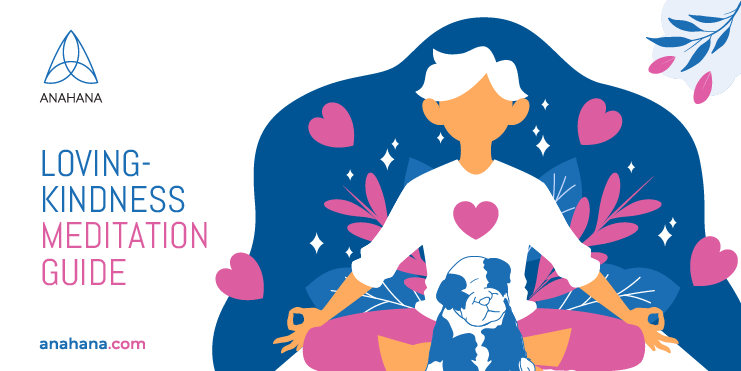
Table of Contents
During loving-kindness meditation (LKM), individuals participate in sending loving kindness and compassion to themselves and others.The self-care technique sharpens one’s capacity for compassion and empathy so they can receive their own love and kindness and send selfless love to living beings around them. Those who regularly practice loving-kindness meditation have greater forgiveness, self-acceptance, and connectedness.
How Loving-Kindness Meditation Practice Works
A study by the University of Wisconsin-Madison took fMRI scans of Tibetan monks and meditators who have practiced loving-kindness meditation for a minimum of 10,000 hours. The scans showed that these individuals brain circuits had a greater capacity to detect others’ emotions and subjective feelings than the active control groups. Further, the longer they practiced LKM, the stronger the connections were and the greater their capacity for positive emotions. This research suggests tremendous mental health improvements through loving-kindness meditation.
Loving-kindness increases one’s capacity for unconditional love more than any other meditative practice. It teaches us to expand this past our family and friends so that it can reach ourselves, strangers, and the world as a whole. Through LKM, we learn to find love, empathy, and compassion for those we experience conflicting situations.
The Benefits of Loving-Kindness Meditation
 Although significant differences between individuals may influence the results, practicing loving-kindness meditation has many powerful benefits. Some of these benefits that will improve the subjective well-being of practitioners include:
Although significant differences between individuals may influence the results, practicing loving-kindness meditation has many powerful benefits. Some of these benefits that will improve the subjective well-being of practitioners include:
1. Increases positive emotions
Just a short practice of loving-kindness meditation helps to decrease negative symptoms and increase positive emotions. One seven-week study found that participants experienced more cheerfulness, fulfillment, joy, love, and appreciation at the end of the study, overall increasing their life satisfaction.
2. Reduces self-criticism
It reduces self-criticism and enhances self-love, which is very important for those who experience anxiety and are overly hard on themselves. Being more accepting of one's self promotes a healthy mind for self-satisfaction. Further, it increases empathy and compassion for ourselves and others, allowing us to be more understanding to strengthen relationships.
3. Treats chronic pain
The results of a single eight-week study, where researchers used loving-kindness meditation t reduce chronic lower back pain, found that the mindfulness meditation participants had a more significant decrease in pain and psychological distress by the end of the trial. Further studies have found it also significantly reduces tension for migraines and headaches.
4. Reduces anxiety, stress, and depressive symptoms
According to PubMed, loving-kindness meditation is applied in behavioral therapy for emotion regulation and mental health conditions, including borderline personality disorder. As a psychological intervention for those suffering from depression, coping with strains of long-term caregiving, social anxiety, anger, and partner conflict. It provides emotional regulation as a form of positive psychology, promoting positive feelings through mindfulness-based stress reduction. Kindness and compassion meditation practices have a positive effect on stress management.
5. May slow the aging process
According to one study on PubMed, frequent practice of loving-kindness meditation may slow the aging process. It compares part of the chromosome associated with aging (Telomeres) to an age-matched control group. The longer it is, the younger we are biological. It found that women who practice loving-kindness were more likely to have longer telomeres.
How to Practice Loving-Kindness Meditation
 There are numerous ways to practice loving-kindness meditation. Each variation follows a core psychological operation that generates kind intentions and loving emotions.
There are numerous ways to practice loving-kindness meditation. Each variation follows a core psychological operation that generates kind intentions and loving emotions.
Here is a simple and powerful loving-kindness meditation technique to try:
- Begin by carving out some self-care time. This could be first thing in the morning or even a few minutes at work. Sit comfortably, close your eyes, take a few deep breaths and immerse yourself in the present moment.
- Picture yourself in a state of complete emotional and physical wellness and inner peace. Begin cultivating love first for yourself, and take a moment to appreciate all the being. Focus on this positive emotional feeling. Breathe in feelings of love, and breathe out negativity and tension.
- Repeat up to four positive affirmations. Feel free to come up with your own, but here are a few examples:
- Immerse yourself in these feelings of self-compassion and comfort. Let these feelings take over the body and mind, so the whole self fills with loving-kindness.
- Here, choose to stay present with yourself or shift the focus to loved ones. Begin with someone you are close to and start expressing gratitude and love for this individual. Hold on to this sentimental feeling. If you would like, repeat your choice of reassuring phrases.
- After focusing on an individual of choice, start to bring other important people in life into awareness with neutral visualization. One by one, visualize them with gratitude and love. Work the way through as many friends and family members as wished.
- If it feels appropriate, extend these feelings and thoughts to neighbors, acquaintances, and people around the globe. Potentially, it is possible to include those experiencing conflict with to assist in reaching forgiveness and peace.
- When satisfied, open your eyes. Internalize how loving-kindness practice makes you feel and allow yourself to visit these feelings throughout the day.
-
- May I be safe
- May I give and receive appreciation today
- May I be happy
- May I be healthy, strong, and peaceful
Frequently Asked Questions about Loving Kindness Practice
 Who invented loving-kindness meditation?
Who invented loving-kindness meditation?
It is unknown if there was one specific inventor of the meditative practice. It was invented in ancient India approximately 2,500 years ago.
How did loving-kindness meditation originate?
Loving-kindness meditation, or Maitri, originated in ancient India and came from different Buddhist traditions. It refers to a mental state with unconditional kindness to all beings, including the self.
Does loving-kindness meditation work?
Yes, loving-kindness practice does work. There is extensive research to back the meditative practice and its positive effect on one’s wellness.
How to cultivate loving-kindness meditation?
Practicing loving-kindness meditation every day will help cultivate compassion within you. Further, the compassion manifested in the meditative mantras can be brought into your daily life. In other words, practice what you preach. Self-compassion acts of kindness, relaxed judgments. The more you practice loving-kindness meditation, the easier this will be for you.
References
How to Practice Loving Kindness Meditation
Loving-kindness and compassion meditation: potential for psychological interventions
Loving-Kindness Meditation for Chronic Low Back Pain Results From a Pilot Trial
Loving-Kindness Meditation practice associated with longer telomeres in women

By: Anahana
The Anahana team of researchers, writers, topic experts, and computer scientists come together worldwide to create educational and practical wellbeing articles, courses, and technology. Experienced professionals in mental and physical health, meditation, yoga, pilates, and many other fields collaborate to make complex topics easy to understand.
